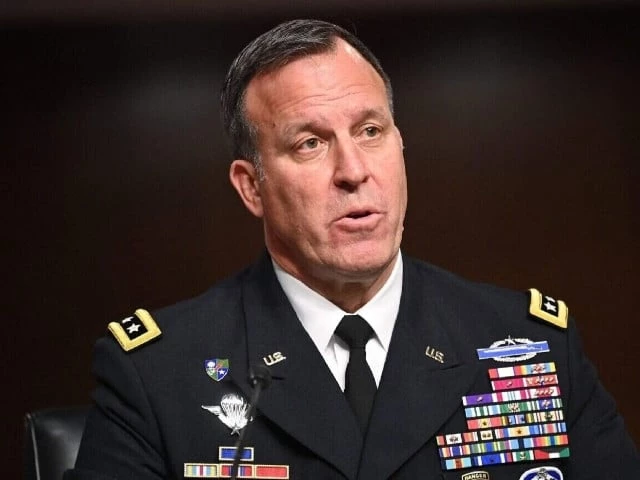'Phenomenal partnership': US general lauds Pakistan's counterterrorism efforts
With limited US intel, Pakistan killed dozens of ISIS-K militants, captured five top targets: Gen Michael Kurilla

United States Central Command (Centcom) Chief General Michael Kurilla has lauded Pakistan’s counterterrorism efforts, particularly its role in combating the militant group ISIS-Khorasan (ISIS-K), describing the country as a key partner in regional security operations.
Speaking during a hearing of the House Armed Services Committee in Washington on Tuesday, Kurilla described ISIS-K as “one of the most active groups attempting external plots globally, including against the US homeland.”
He added that hostility between the Taliban and ISIS-K had intensified, forcing many fighters into the tribal regions along the Afghan-Pakistan border.
The Centcom chief praised Pakistan’s cooperation, terming it a “phenomenal partnership.” He said that with limited intelligence support from the United States, Pakistan had managed to kill dozens of ISIS-K militants and capture at least five high-value individuals.
Among those apprehended was Jafar, identified as a key figure behind the 2021 Abbey Gate bombing at Kabul airport. “The Chief of Army Staff called me directly and said, ‘I’ve caught him. I’m willing to extradite him back to the United States. Please inform the Secretary of Defense and the President,’” Kurilla told the committee.
While acknowledging Pakistan’s successes, the general noted that ISIS-K remains operational in the region. “They are mostly confined to the border areas of Pakistan, occasionally attempting to re-enter Afghanistan,” he said, adding that the United States continues to monitor the group’s movements.
Earlier this year, US president Donald Trump also acknowledged Pakistan’s role in counterterrorism. Speaking before a joint session of Congress in March, he said: “I want to thank, especially, the Pakistani government for helping arrest this monster,” referring to Jafar’s capture.
Highlighting Pakistan’s own internal security challenges, Kurilla told lawmakers that the country has faced over 1,000 terrorist attacks in its western regions since the beginning of 2024, resulting in approximately 700 deaths and 200 injuries. He referred to Pakistan as an “exceptional partner” in counterterrorism efforts.
Commenting on the current strength of ISIS-K, the Centcom chief said the group is at a “low point” following several months of sustained pressure. He said intelligence gathered from interrogations has provided “substantial” information.
However, he cautioned that the threat remains, citing the group’s involvement in recent international attacks, including the Crocus City Hall bombing in Moscow and another in Kerman, Iran. “Whatever we have to do to avoid going back to that place would be critical,” he warned.
Kurilla also stressed the importance of maintaining strategic ties with both Pakistan and India. “We have to have relationships with Pakistan and with India. I don’t believe it’s a binary switch that we can’t have one with Pakistan if we have one with India. We should look at the merits of the relationship for the positives that it has,” he said.
WATCH: Trump Thanks Pakistan Government for Helping Capture Top ISIS Terrorist
The remarks come in the backdrop of a broader shift in US policy towards the region.
Following a military standoff between India and Pakistan that brought the two nuclear-armed neighbours close to war, Trump announced a ceasefire on May 10. Since then, Trump has repeatedly taken credit for defusing tensions while commending Pakistan’s leadership for its role.
In a notable policy reversal, the Trump administration recently approved $397 million for the maintenance of Pakistan’s F-16 fighter jet fleet.
The allocation follows a freeze on foreign aid and is designated strictly for counterterrorism operations. A US-monitored oversight mechanism will ensure the aircraft are not used against India, according to a Reuters report.
Despite an executive order halting most overseas funding, Washington has granted approximately $5.3 billion in security-related exemptions—with Pakistan’s allocation among 243 such cases.



1724319076-0/Untitled-design-(5)1724319076-0-208x130.webp)

















COMMENTS
Comments are moderated and generally will be posted if they are on-topic and not abusive.
For more information, please see our Comments FAQ